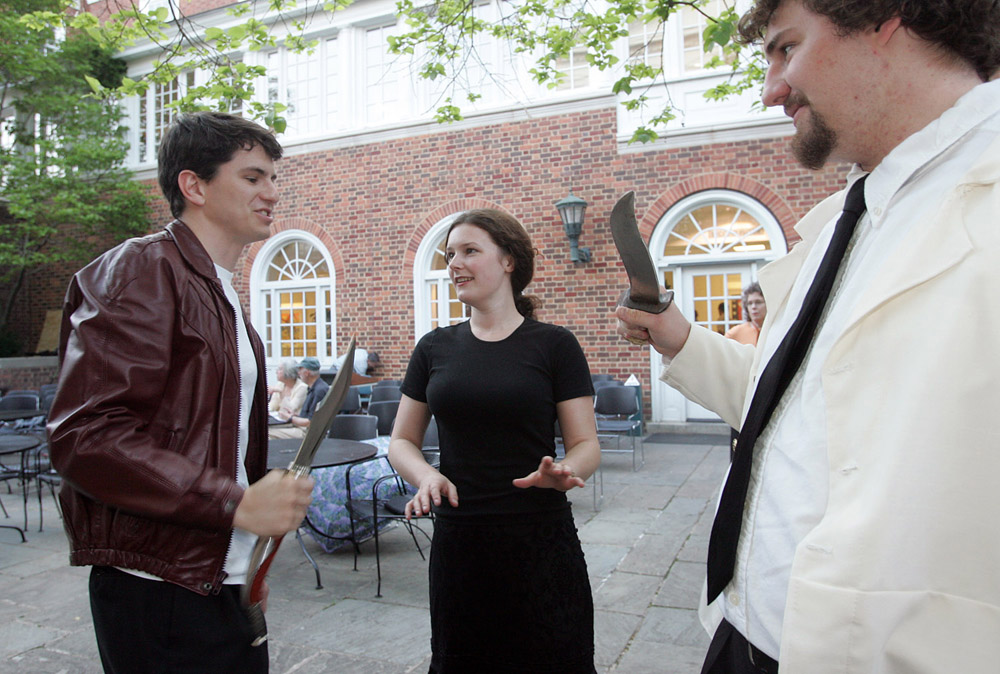May 11, 2006 —For years, college campuses have been known as breeding grounds for alternative rock bands. But fourth-year University of Virginia student Anne Reynolds Holt has made it her mission to keep opera alive in the hearts of her fellow students.
Holt said opera is a vital part of contemporary culture, pointing to arias and operatic music being used in commercials such as a recent American Airlines spot. “I have also found many people who have at least one or a couple of songs from operas on their iPods,” she added.
For the coloratura soprano who’s been singing since she was on the performance-track in a conservatory prep school, developing a passion for opera in both performers and audiences is what drives her. This spring she led an effort to start a student organization, Opera Viva, the first student opera company at U.Va., and directed its inaugural production, Bizet’s “Carmen.”
It’s no surprise to her that opera has a following among the students at U.Va. Opera’s stories of love, death and betrayal are universal and very accessible. After all, soap opera came from opera, Holt said.
She realized early on that the performance path was not intellectual enough for her and turned to an academic pursuit of opera. A distinguished interdisciplinary studies major, she combined music, history, English and drama to create a major in dramaturgy, an area of study that focuses on applying historical, cultural and literary research to play and opera production, a major that is not offered at U.Va.
“In all aspects of what would be required of a dramaturge, she carried it out,” said William Wilson, who oversees the University’s interdisciplinary and honor majors programs.
“She has original ideas and carried her area of study beyond what many masters students do,” he said.
As an interdisciplinary scholar Holt called on guidance from associate professor of music Elizabeth Hudson, professor of history Anne Schutte, professor of English Clare Kinney and drama professor John Frick to fashion her major and to oversee her senior thesis.
Holt, whose goal is to direct, feels strongly that by understanding the academic side, performers are more in tune with the characters and not just puppets of the director.
For her thesis she focused on American soprano Geraldine Farrar, who, as a performer and director, was committed to opera as popular theater, a commitment Holt shares. She did much of her research in Washington, D.C., at the Library of Congress, where Farrar’s papers provided invaluable primary source material for her project.
“It’s unique for an undergraduate to go into a specialized archive,” said Frick. “She looked forward and backward and at other events in Geraldine Farrar’s time.”
Holt has impressed her professors throughout her time at U.Va. The spring semester of her second year Holt took a seminar on gender in early modern European history from Schutte. For the class Holt chose to write a paper on the issue of marriage for castrati. “It’s an issue I didn’t even know existed,” Schutte said. “Annie wrote what would be a fabulous paper for a graduate student. It was an amazing paper for a second-year student.”
Schutte, who has been teaching since 1966, said Holt is “one of the two most interesting undergrads I have taught in all that time.”
Schutte also praised Holt’s “guts, drive and determination. She’s a self-starter.”
In fall 2005 Holt took the initiative to lead an independent study class that would serve as the basis for an ambitious production of “Carmen,” which she directed in the spring. The class of 10 students, with Holt as catalyst, laid the groundwork for shaping every aspect of the production. They studied the historical background of the opera, cut it down from four hours to a manageable length, translated it from French to English and planned the lighting and costumes for the production, which required the efforts of 45 students who were involved in behind-the-scenes as well as performance roles.
“The students were very serious and did a high level of thinking about the opera,” said Michael Slon, assistant professor of music and the faculty adviser for the class.
Holt credits the three summers she spent at the Opera Festival di Roma, the creation of the late Louisa Panou-Takahashi, who taught voice at U.Va., with giving her the tools to tackle such an ambitious task as staging “Carmen.” At the festival she worked as costume designer, stage manager and assistant to the director.
“Part of my journey to becoming a director has taught me that it’s about leadership,” Holt said. In addition to her time at the Opera Festival di Roma, Holt also directed a production of Purcell’s “Dido and Aeneas” in the spring of 2005 through the student-run Spectrum Theater. Holt said she feels that the whole experience has been wonderful and that she is lucky to have these leadership opportunities as well as the interdisciplinary perspective the Distinguished Major Program offers as part of her college experience.
In the end, Holt believes, it’s not that you have to work to make opera interesting; it’s that you have to reveal the fact that opera is interesting. She also learned a very important lesson from Panou-Takahashi: “It’s about the passion.”
Holt was one of 18 students chosen nationally in 2005 to receive a Beinecke Scholarship, which provides $32,000 for graduate education. Her plans include earning an M.F.A. in theater directing to develop her performance skills and a Ph.D. in theater studies to enhance her academic interests.
Media Contact
Article Information
May 11, 2006
/content/scholar-instructor-director-performer-holt-everywoman-opera

